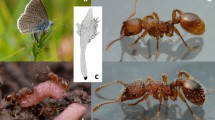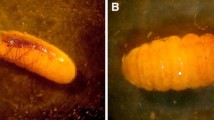Summary
Pheidole titanis Wheeler, an ant that occurs in desert and deciduous thorn forest in the southwestern United States and western Mexico, is a predator on termites. In the dry season well-coordinated raids against termite foraging parties occur early in the morning or late in the afternoon, whereas in the wet season most raids occur at night. This seasonal shift in the timing of raids is due to the increased activity of a fly (Diptera: Phoridae) that is a specialist parasitoid on P. titanis workers and soldiers. When parasitic flies discover P. titanis nest entrances or raiding columns, workers stop foraging and defend themselves against oviposition attacks. Flies are only active during the day and never interfere with foraging at night. However, P. titanis does not increase the frequency of raids at night and, as a result, colonies collect less food in the wet season compared to the dry season. Presence of parasitic flies also interferes with normal defense behavior of P. titanis against conspecific and heterospecific enemy ants. Dissections of P. titanis workers and soldiers suggest that the parasitism rate by flies is less than 2% and observations indicate that parasitic flies are much rarer than their host workers and soldiers. Nonetheless, these parasites exert a strong ecological impact on their host.
Similar content being viewed by others
References
Bernstein RA (1976) The adaptive value of polymorphism in an alpine ant, Formica neorufibarbis gelida Wheeler. Psyche 83:180–184
Bullock SH (1986) Climate of Chamela, Jalisco and trends in the south coastal region of Mexico. Arch Meteorol Geophys Bioclimatol Ser B Theor Appl Climatol 36:297–316
Creighton WS, Gregg RE (1955) New and little-known species Pheidole (Hymenoptera: Formicidae) from the southwestern United States and Northern Mexico. Colo Univ Studies, Biol Ser 3:1–46
Davidson DW (1977a) Species diversity and community organization in desert seed-eating ants. Ecology 58:711–724
Davidson DW (1977b) Foraging ecology and community organization in desert seed-eating ants. Ecology 58:725–737
Disney RHL (1982) Three new species of scuttle fly (Diptera: Phoridae) that parasitize ants (Hymenoptera: Formicidae) in North America. J Zool Lond 197:473–481
Feener DH Jr (1981) Competition between ant species: outcome controlled by parasitic flies. Science 214:815–817
Feener DH Jr (1986) Alarm-recruitment behaviour of Pheidole militicida Wheeler (Hymenoptera: Formicidae). Ecol Entomol 11:67–74
Feener DH Jr (1987a) Size-selective oviposition in Pseudacteon crawfordi (Diptera: Phoridae), a parasite of fire ants. Ann Entomol Soc Am 80:148–151
Feener DH Jr (1987b) Alarm-recruitment in Pheidole morrisi (Hymenoptera: Formicidae), and a general model of defense behavior in Pheidole. J Kans Entomol Soc 60:569–575
Hunt JH (1974) Temporal activity patterns in two competing ant species (Hymenoptera: Formicidae). Psyche 81:237–242
Levings SC (1983) Seasonal, annual, and among-site variation in the ground ant community of a deciduous tropical forest: some causes of patchy species distributions. Ecol Monogr 53:435–455
Levings SC, Windsor DM (1984) Litter moisture content as a determinant of litter arthropod distribution and abundance during the dry season on Barro Colorado Island, Panama. Biotropica 16:125–131
Lott EJ, Bullock SH, Solis-Magallanes JA (1987) Floristic diversity and structure of upland and arroyo forests of Coastal Jalisco. Biotropica 19:228–235
Milliken GA, Johnson DE (1984) Analysis of messy data, vol. 1. Designed experiments. Van Nostrand Reinhold, New York
Oster GF, Wilson EO (1978) Caste and ecology in the social insects. Princeton University Press, Princeton
Sanders CJ (1972) Seasonal and daily activity patterns of carpenter ants (Camponotus spp.) in northwestern Ontario (Hymenoptera, Formicidae). Can Ent 104:1681–1687
Torres JA (1984a) Niches and coexistence of ant communities in Puerto Rico: repeated patterns. Biotropica 16:284–295
Torres JA (1984b) Diversity and distribution of ant communities Puerto Rico. Biotropica 16:296–303
Whitford WG, Depree DJ, Hamilton P, Ettershank G (1981) Foraging ecology of seed-harvesting ants, Pheidole spp. in Chihuahuan desert ecosystem. Am Midl Nat 105:159–167
Whitford WG, Ettershank G (1975) Factors affecting foraging activity in Chihuahuan desert harvester ants. Environ Entomol 4:689–696
Wilson EO (1971) The insect societies. Harvard University Press, Cambridge
Wilson EO (1976) The organization of colony defense in the ant Pheidole dentata Mayr (Hymenoptera: Formicidae). Behav Ecol Sociol Biol 1:63–81
Author information
Authors and Affiliations
Rights and permissions
About this article
Cite this article
Feener, D.H. Effects of parasites on foraging and defense behavior of a termitophagous ant, Pheidole titanis Wheeler (Hymenoptera: Formicidae). Behav Ecol Sociobiol 22, 421–427 (1988). https://doi.org/10.1007/BF00294980
Received:
Accepted:
Issue Date:
DOI: https://doi.org/10.1007/BF00294980




